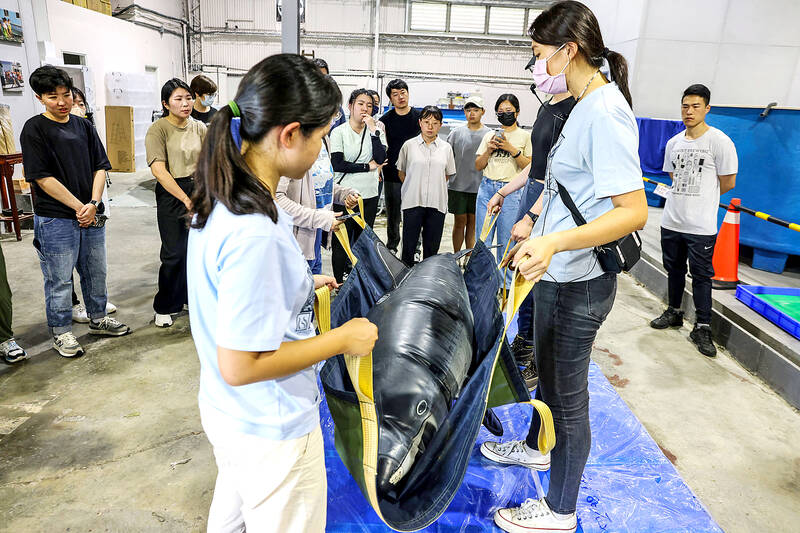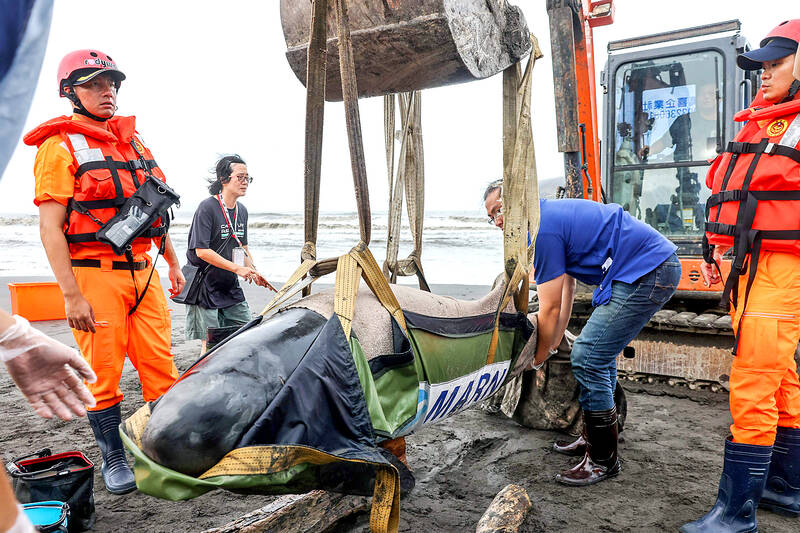Taiwanese volunteers gathered around a large inflatable whale as they learned how to help beached sea mammals — an increasingly common sight across the country.
More than 100 dolphins and whales wash up on Taiwan’s beaches every year, a sharp rise over the past decade, researchers said.
After spotting a beached mammal, volunteers at a recent training run by the Taiwan Cetacean Society were told not to push the mammals back into the sea, but to immediately call the coast guard with their precise location.

Photo by Cheng I-hwa, AFP
The Coast Guard Administration works with groups like the Taiwan Cetacean Society in emergency operations that often include trained volunteers.
Taiwan Cetacean Society secretary-general Tseng Cheng-tsung (曾鉦琮) said he developed “a sense of mission” after participating in multiple rescues, which inspired him to get a master’s degree in marine biology.
“Many people like to get close to nature and protect it,” Tseng said.

Photo: Cheng I-hwa, AFP
Saleswoman Joanna Hung, 36, joined the training after seeing “rather bloody footage” of a plastic straw being pulled out of the nose of a rescued turtle.
“If we haven’t come to class, we would act on our own ideas, which may cause more harm if we don’t have the right knowledge,” Hung said. “I want to try my best to help them survive.”
Taiwan began reporting an uptick of stranded animals in 2016, when 90 were found ashore, a jump from a few dozen in previous years, said Yang Wei-cheng (楊瑋誠), an expert on cetacean conservation at National Taiwan University.
Yang pointed to environmental changes, such as the rise of sea surface temperature and human activities that cause noise and other pollution, as reasons for the increase.
Lindsay Porter, vice chair of the International Whaling Commission’s scientific committee, said the highest cause of death for all cetacean species worldwide is bycatch, the accidental capture of marine life by fishing gear such as nets and fishing hooks.
“Strandings numbers may increase if fishing practises change,” Porter said, adding that coastal construction projects could “cause fishing vessels to abandon those areas” and move to new spots.
Increasing underwater noise, such as from marine military activity, could also be a factor, she said.
“Noise levels associated with marine military activity can be particularly loud and intense and have been shown elsewhere to cause mortality as well as hearing impairment in cetaceans,” she said.
While the causes of the strandings on Taiwan remain unclear, Porter said the data gathered was genuine rather than an increase in reporting frequency.
Weather could also be a factor. After Typhoon Gaemi hit Taiwan in late July, 15 dolphins, whales and turtles washed up on beaches across the country in just two weeks, Taiwan Cetacean Society data showed.
Usually, fewer than 10 beached mammals are reported every month between June and September, the data showed.
Two days after Typhoon Gaemi made landfall in Taiwan, a beached dwarf sperm whale was found in Yilan County. The mammal was still breathing when Taiwan Cetacean Society vets worked quickly to move it on a tarp as volunteers poured water over it, but when they tried to move the animal using an excavator, it died.
Transporting it “caused it quite a bit of stress so it held its breath for more than 10 minutes and died,” said Hsiao Shun-ting (蕭舜庭), the vet on scene.
The majority of the stranded cetaceans in Taiwan die — either because they were already sick when they were beached or from the stress of returning them to the ocean, the Cetacean Society said.
“People often ask us this question... Is it worth it?” Tseng said.
However, the wins are unforgettable — such as when a beached 400kg false killer whale was released back into the ocean, he said.
The operation to save the 3.15m creature took nine days and cost more than US$6,000, Tseng said.
More than 500 volunteers and 100 civil servants helped, he said.
Tseng said he hoped that those who attended the training would pass the love and knowledge of sea animals on to their friends and families.
“I think these people will slowly influence others around them ... and help move Taiwan’s marine conservation work forward,” he said.

An essay competition jointly organized by a local writing society and a publisher affiliated with the Chinese Communist Party (CCP) might have contravened the Act Governing Relations Between the People of the Taiwan Area and the Mainland Area (臺灣地區與大陸地區人民關係條例), the Mainland Affairs Council (MAC) said on Thursday. “In this case, the partner organization is clearly an agency under the CCP’s Fujian Provincial Committee,” MAC Deputy Minister and spokesperson Liang Wen-chieh (梁文傑) said at a news briefing in Taipei. “It also involves bringing Taiwanese students to China with all-expenses-paid arrangements to attend award ceremonies and camps,” Liang said. Those two “characteristics” are typically sufficient

A magnitude 5.9 earthquake that struck about 33km off the coast of Hualien City was the "main shock" in a series of quakes in the area, with aftershocks expected over the next three days, the Central Weather Administration (CWA) said yesterday. Prior to the magnitude 5.9 quake shaking most of Taiwan at 6:53pm yesterday, six other earthquakes stronger than a magnitude of 4, starting with a magnitude 5.5 quake at 6:09pm, occurred in the area. CWA Seismological Center Director Wu Chien-fu (吳健富) confirmed that the quakes were all part of the same series and that the magnitude 5.5 temblor was

The brilliant blue waters, thick foliage and bucolic atmosphere on this seemingly idyllic archipelago deep in the Pacific Ocean belie the key role it now plays in a titanic geopolitical struggle. Palau is again on the front line as China, and the US and its allies prepare their forces in an intensifying contest for control over the Asia-Pacific region. The democratic nation of just 17,000 people hosts US-controlled airstrips and soon-to-be-completed radar installations that the US military describes as “critical” to monitoring vast swathes of water and airspace. It is also a key piece of the second island chain, a string of

The Central Weather Administration has issued a heat alert for southeastern Taiwan, warning of temperatures as high as 36°C today, while alerting some coastal areas of strong winds later in the day. Kaohsiung’s Neimen District (內門) and Pingtung County’s Neipu Township (內埔) are under an orange heat alert, which warns of temperatures as high as 36°C for three consecutive days, the CWA said, citing southwest winds. The heat would also extend to Tainan’s Nansi (楠西) and Yujing (玉井) districts, as well as Pingtung’s Gaoshu (高樹), Yanpu (鹽埔) and Majia (瑪家) townships, it said, forecasting highs of up to 36°C in those areas